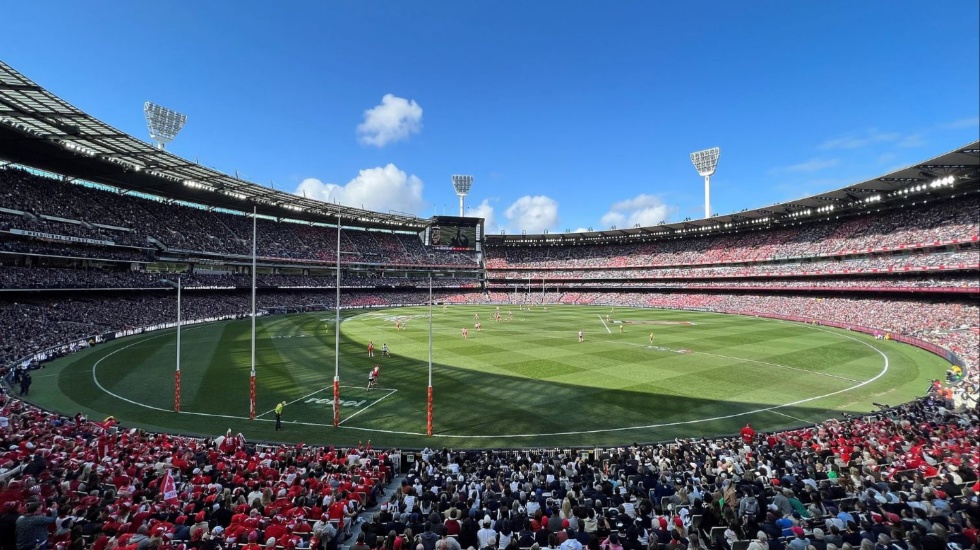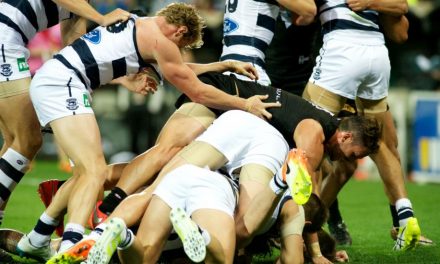The opening bounce of the 2022 AFL grand final between Geelong and Sydney. Photo: AFL MEDIA
I’m a bit of a football traditionalist, so the AFL’s official announcement on Wednesday that the grand final would again start at 2.30pm was music to my ears. In truth, though, it’s not when the game is scheduled but where which was the far more important detail.
We didn’t need to be told that, of course, thanks to the AFL’s contract with the Victorian state government, which has the MCG locked in as the grand final venue (pandemics notwithstanding) until 2059.
But in an era where the differences between the clubs at the top of the ladder are at best marginal, the self-described “People’s Ground” is looming large as a potentially decisive premiership factor, and in 2023 arguably even more so.
Why? Because if the top four remains the way it looks now, we’re every chance to end up with a grand final between a team for whom the MCG is like a personal security blanket, and an opponent for whom it is a curse.
There’s no prizes whatsoever for guessing at which venue Collingwood and Melbourne would choose to play for their lives, the Pies and Demons with clearly the best recent MCG records of any teams.
Conversely, Brisbane, while boasting every bit as pronounced a home advantage at its own Gabba over the past five seasons, has been ritually awful at the G, where it has now lost 12 of its past 13 appearances. Port Adelaide, meanwhile, since 2020, has won 27 of 39 games on its home deck, but appeared at the MCG just six times over the same period, and lost four of those.
In the context of advantages and disadvantages between the likely preliminary finalists, not to mention a home and away season in which just on 40 per cent of games have been decided by three goals or less, those are massive and possibly decisive discrepancies.
Collingwood has been pretty good everywhere under the coaching of Craig McRae, but as good as invincible at the ‘G’, where since Round 11 last year, it has won 16 of its past 17 games, the solitary defeat by just six points in last year’s qualifying final against Geelong.
For the Magpies, it’s not anything in particular about the ground, with which all Victorian clubs are very familiar and whose dimensions are pretty orthodox. It’s about the black-and-white army routinely filling the stands, whose vocal support seems to have got even louder lately, and is very much a “19th man” of sorts.
Collingwood drew a hardly-shabby 37,000 to the G last Sunday for Greater Western Sydney, but consider that was only the second of the Pies’ last 10 MCG appearances to draw fewer than 70,000 people, then ponder the fact that in the 17-game MCG sequence, eight games have been decided by seven points or less, and of those the Pies have won seven.
PLEASE HELP US CONTINUE TO THRIVE BY BECOMING AN OFFICIAL FOOTYOLOGY PATRON. JUST CLICK THIS LINK.
Melbourne’s record of 21 wins and a draw from its last 30 MCG games is the competition’s second-best recent MCG winning percentage, with Geelong 20-10 over the same game span, and Richmond a surprisingly poor 54 per cent over the same journey given at one stage it strung together 22 wins on the trot there over 2017-18.
Let’s hypothesise for a moment that Collingwood ends up playing Brisbane in the 2023 grand final. Would grand final history ever have seen a premiership playoff where favouritism was so dictated by the venue? It’s doubtful. Particularly when you remember that the Magpies’ only loss so far this season came against Brisbane at the Gabba by 33 points.
I can only think of two other recent scenarios vaguely similar, Adelaide’s 2017 grand final match-up with Richmond, and Hawthorn and West Coast playing off in 2015.
The Eagles that year had comfortably defeated the Hawks in a Subiaco qualifying final. Hawthorn’s 46-point grand final win over the same opponent three weeks later represented a 78-point turnaround.
And Adelaide fans are still shirty (understandably so) about the Crows in 2017 having finished on top, winning both their lead-up finals yet still having to play a lower-ranked side on the opponent’s home ground.
Adelaide had belted Richmond at Adelaide Oval earlier in the season and would again early in 2018, too. But the Crows barely uttered a squeak away from home in the big one. Even they, however, at least went into that game having won or drawn their five previous games at the MCG.
Similarly, their local rival Port Adelaide this season, whilst having been smashed by Collingwood at the G in round two, can take some comfort at least from its three preceding MCG games having all been lost by just 12 points or less.
Brisbane’s hideous one win from 13 MCG record, in contrast, includes four defeats by 63 points or more, and three more of 40 points-plus. Don’t tell me that wouldn’t be playing on their minds even a little were the Lions’ grand final opponent be a Collingwood which could conceivably by then have a record of 26 wins from 27 at the same ground.
In fact, who’s to say it won’t be playing on their minds should they walk off the Gabba having beaten Gold Coast, boasting a record on their own home turf by then an amazing 44 wins from 52, yet knowing when it comes to matters of premierships, and the ground at which they’re won, even that will count for zero.
And that’s whether the grand final was played at 2.30pm, 4.45pm, 7.30pm, or 6am on a Wednesday morning.
This article first appeared at ESPN.











